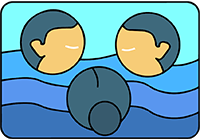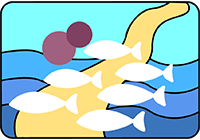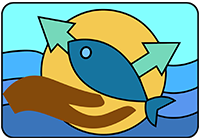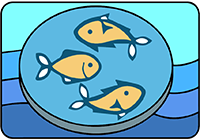1.Reimagining Regional Fisheries Management: Participatory Approaches for Near Real-time Stock Assessment
FAO reports that only 25% of the world catch comes from the numerically assessed stocks and the catch details from the Bay of Bengal region are riddled with inconsistencies, particularly due to the predominant small-scale multi-species fishery. The data on the fishing effort and catch are collected periodically by all the countries. However, the research studies on the stock status are not robust enough to influence the state policy on appropriate fisheries management.
The IGO envisions to strengthen the methodological framework, by partnering with the regional governments and expert institutions from the member countries, for collecting fisheries data, analysing them to determine the status of the stock, and visualizing the same to aid in informed decision making by the resource managers. The methodological framework will be tested on a pilot basis in different geographies and a roadmap will be developed to scaleup the approach in the region.

2.Capturing the Hidden Harvest: A Framework for Small-Scale Multi-Species Fishery
The objective of this multi-disciplinary programme is to assess and understand the vulnerabilities of artisanal and small-scale fisheries (ASSF) in the national and regional contextand evolve livelihood strategies to strengthen their adaptation and resilience. The ASSF constitutes the backbone of the marine fisheries sector of the Bay of Bengal region providing employment and food security in the coastal areas.
The proposed programme will be based on emerging global methodologies to quantify the role of ASSF while adapting it for local and regional ground realities. The output of the programme will contribute to the Sustainable Development Goals (SDG), especially SDG 2: No Poverty; SDG 14: Life Below Water; SDG 5 – Gender Equality and SDG 8 – Decent Work and Economic Growth.

3.Shared Prosperity: Governance and Institutional Framework for Assessment and Management of Blue Economy in the Bay of Bengal
Blue Economy principles are identified by the member-countries to foster economic development in their respective countries. By nature, the blue economy is multi-sectoral and balancing is required to optimize the net gain from the activities while maintaining or sustainably enhancing ecosystem services. Such balancing requires investment in marine spatial planning, coastal zone development, and integration of ecosystem approaches.
The IGO envisions to supporting the development of national and regional guidelines for blue economy development. Developing framework for mapping, assessment,and sustainable utilisation of the blue economic potential at regional, national and sub-national; Contextualising fisheries in blue economy and identifying complementarities; Capturing the socio-economic implications for coastal/fishing communities and maximising the gains for small-scale fishers; and Evolving appropriate governance frameworks would be priority areas. A multi-disciplinary research process will aid in simulating multiple pathways for optimal solutions.

4.Back to Basics: Revitalising Traditional Knowledge for Sustaining Fisheries Future
BoB region has been a cradle of civilisation and the coastal fishing communities have nurtured and sustained arich pool of practical knowledge and skillsets honed over several centuries. Traditional knowledge and modern science have borrowed from and influenced each other, especially over the last two centuries. However, there is a need to further improve the documentation and deepen the understanding of the indigenous community-held knowledge related to fisheries. Modern science might still benefit from this appreciation and knowledge sharing.
This thematic area will facilitate and strengthen regional, national and sub-national efforts to map and bring to light the hidden treasure trove of traditional knowledge and identify areas that modern science can validate and enrich for the public good.

5.Aquaculture-Fisheries Co-development for Stock Enhancement and Sea Ranching
The Bay of Bengal region is a leading contributor to both aquaculture and fisheries. Increasing population, limited land resources, and depleting marine fish stocksin a changing climate scenario pose a serious challenge for the fisheries sector to provide adequate and affordable food and nutrition. Increasing operational costs may also drive the fishers and the farmers to poverty.
The proposed research programme, taking advantage of the accumulated knowledge in the region on aquaculture, breeding, hatchery management, and stock assessment, will develop a methodological framework for fisheries enhancement at the national and regional levels. The interconnected issues, such as identification of candidate species, technology readiness, fisheries management, ecosystem requirement and stakeholder buy-in, identification of capacity building requirements, facilitating south-south cooperation in fisheries enhancement, and development of regional management plans would be the focal areas.





